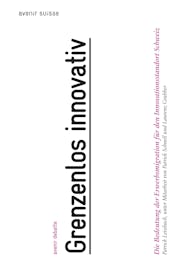Swiss economic history is a history of migration. Migrant pioneers have established world-renowned companies and laid the foundations of industries that have long been part of the DNA of the Swiss economy. But how much do people with foreign roots contribute to Swiss innovation these days? In the latest Avenir Suisse study, Patrick Leisibach draws on new data to paint a comprehensive picture of the importance of immigration for the Swiss innovation ecosystem.
Foreigners Shape Innovation
In relation to their share of the population (26%), foreigners make an above-average contribution to Switzerland’s innovation performance, accounting for
- 39% of all company founders,
- 50% of all start-up founders and 78% of all “unicorn” founders, and
- 37% of all inventors (based on patent applications).
Of those employed in the ten industries with the highest value added in Switzerland, 37% have a foreign passport; in the pharmaceutical industry the figure is even higher at 56%. A similar picture emerges at the universities: From professors (51%) to PhDs in STEM subjects (74%), the proportion of foreigners is above average.
Innovation is generally a “team sport.” In this country, mixed teams of different nationalities and cultures have become the norm. In the present study, however, the immigration effect is measured exclusively by nationality. There is hardly any reliable data on people with a background of migration. Consequently, it seems likely that migration plays an even more significant role in Switzerland’s innovative strength.
Safeguarding Switzerland’s Innovative Strength in the Long Term
As the analysis shows, companies and universities are dependent on foreign talent to be successful innovators. However, three developments are already setting limits on Switzerland as a center of innovation and will do so even more in the future: demographic aging, intensified international competition for talent, and Switzerland’s immigration policy toward third countries.
What needs to be done so that Switzerland can benefit from foreign talent in the long term and maintain its innovative strength? First of all, it’s important to note that this analysis focuses on the economic effects on innovative capacity. Especially in view of the already high level of net immigration, other economic as well as sociopolitical and cultural aspects must also be included in the assessment for Switzerland to have a successful, sustainable migration policy that is accepted by the population.
Against this backdrop, our short-term recommendation is to optimize the immigration system for third-country nationals in certain areas:
- Streamline the process for university graduates
- Introduce a “start-up visa”
- Link existing quotas to demographic trends
In the long term, a new, more demand-oriented control regime for labor migration from third countries should be considered: In the case of highly qualified individuals, residence permits could be granted without red tape if a job offer with a certain minimum income were available.
In the view of Avenir Suisse, making better use of the global talent pool will help consolidate Switzerland’s position as the “innovation world champion.” In the long term, there is hardly any way around a debate on the role of third-country migration – primarily as a replacement for sources of skilled labor that are drying up owing to demographic developments. Because as this publication shows, when it comes to innovative strength and prosperity, immigration is not optional, but a must.







